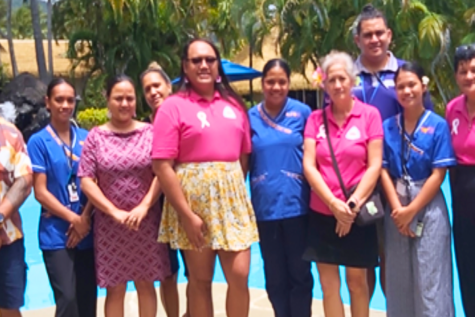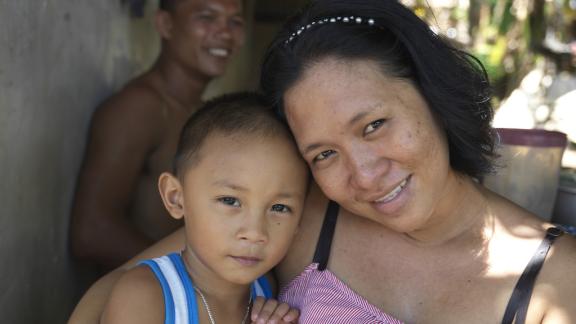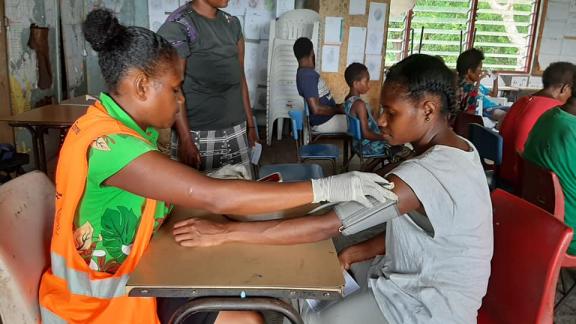Spotlight
A selection of resources from across the Federation

Cook Islands, New Zealand
Ora’anga Meitaki no te Vainetini: Cook Islands Women’s Wellbeing in the Context of Abortion
In 2022, research on abortion, including unsafe abortion, in Cook Islands was conducted by the University of New South Wales, University of the South Pacific Cook Islands Campus Te Puna Vai Mārama | Centre for Research, and Cook Islands Family Welfare Association (CIFWA). Ora’anga Meitaki no te Vainetini: Cook Islands Women’s Wellbeing in the Context of Abortion includes the lived experiences and stories of women, advocates, support persons and health workers in the Cook Islands and Aotearoa New Zealand.
Filter our resources by:

| 15 March 2023
Diverse SOGIESC Inclusion Self-Assessment Toolkit
The new SOGIESC Self-Assessment Toolkit honours the commitments of IPPF's new Strategy 2028 – that is to widen access to SRH to marginalised communities. This toolkit is aimed to support MAs to reach out to the diverse SOGIESC community as they face discrimination, violence, and exclusion, and in some cases, criminalisation just for existing. They are often excluded in all parts of their life; from access to housing, employment, education, healthcare, and more - and with this in mind, these toolkits were developed, ensuring no one gets left behind. The Diverse SOGIESC & Self-Assessment Toolkit allows for the MAs to assess the current status of their programmes with regard to diverse SOGIESC inclusion, and to develop a Diverse SOGIESC Inclusion Programme. This toolkit is not meant as a one-off assessment, but one the MAs can implement periodically to fully visualise the status of Diverse SOGIESC inclusion in their respective MAs as well as highlight the gaps and barriers to Diverse SOGIESC inclusion and what else can be done to ensure that no one gets left behind. In addition, the Diverse SOGIESC Inclusion Training Manual is designed to enhance knowledge on diversity of SOGIESC and create a conceptual and knowledge foundation upon which MA inclusion strategies are to be built. This will ensure that MAs are better equipped when rolling out this Self-Assessment Toolkit in their respective settings. IPPF commits to providing safe and quality care for people who are unjustly excluded and marginalised by focusing on the SRHR needs of gender diverse and LGBTIQ+ communities. These toolkits will continue the Federations’ support for IPPF's MAs in building capacities to better serve gender diverse people.

| 30 January 2023
IPPF 2023 - 2028 Strategy
For 70 years IPPF has championed and delivered quality services, comprehensive information and advocated for just laws so that more people in more places under more circumstances may realize their sexual and reproductive health and rights (SRHR). Started with an act of international solidarity between activists from just a handful of countries, IPPF has since grown into a broad and diverse community of services providers and advocates that stretches around the Earth. Our very existence manifests just how the demand for dignity in sexual and reproductive health and rights is universal to people the world over. But that world is changing rapidly. Tough challenges must be confronted – the toxic legacies of longstanding racism, sexism and homophobia, for example; the deepening impacts of the climate crisis, violence, and inequalities; the escalating consequences of new technologies, population displacements, and habitat destruction. Wherever such dynamics impact people’s lives, IPPF knows enjoyment of SRHR is impacted too. Whenever people confront humanitarian crises, we know their SRHR are thrust into crisis too. Whoever is subject to prejudice, bigotry, or exclusion, has their access to SRHR also eroded. We know that the worst consequences of those injustices are borne by young people in the poorest of communities, in the toughest of places, facing the fewest opportunities. To be impactful in a world of change, IPPF must change too. That is what Strategy 2028 is all about: changing IPPF so it is well equipped to uphold SRHR for those who are left out, locked out or left behind. Our Strategy 2028 sets out a familiar path but in a new direction over far tougher terrain to that clear destination. We will walk that path shoulder to shoulder with young people, and with individuals and communities bearing the full brunt of stigma and prejudice. At each step, we will defend, protect, and celebrate safety, pleasure and wellbeing in sex and reproduction. At every turn, we will denounce powers and authorities who, through policy, practice, and law, undermine dignity and human rights in those intimate realms. And, as IPPF, we will be accountable for who we are, what we do and how we do it. That is our Strategy 2028. It is with immense pride that the IPPF Board of Trustees shares this strategic itinerary with you. We very much hope you will travel this road with us – in your own realities, communities, and contexts. Let’s do that together. Let’s come together, for sexual and reproductive dignity for all - for each and every one of us, to the exclusion of none of us, in the interests of all of us. Kate Gilmore, Chair, BoT, IPPF

| 30 January 2023
Pacific Niu Vaka Strategy Phase II
The Niu Vaka strategy, the second phase of International Planned Parenthood Federation’s Pacific Niu Vaka Strategy for 2023 – 2028. Building from the first phase of the Niu Vaka Strategy (2019 – 2022), the strategy aims to come together and break through the barriers that limit sexual and reproductive health and rights (SRHR), thereby enabling quality SRHR to be realised for everyone in the Pacific. It is an ambitious agenda that is informed by the emerging challenges and opportunities in the region.

| 09 November 2022
RESPOND: Key Annual Achievements At A Glance
The Responding with Essential Sexual and Reproductive Health and Rights (SRHR) Provision and New Delivery Mechanisms (RESPOND) project forms part of the Australian Government Department of Foreign Affairs and Trade’s (DFAT) Indo-Pacific Sexual and Reproductive Health Rights COVID-19 Surge Response (C-SURGE) program. The aim of the RESPOND project is to ensure that populations affected by COVID-19 have enhanced SRHR through the delivery of high-quality and equitable Sexual and Reproductive Health and Family Planning services and the dissemination of trusted and reliable SRHR and COVID-19 information. This will enable sustainable impacts for women, girls, and marginalised groups across the Asia Pacific region. In the first year of RESPOND’s implementation (August 2021- July 2022), IPPF provided 6,642,138 SRH services, generating 640,553 Couple Years Protection (CYPs), reaching 99.7% of the target for the period. 1,644,030 clients were served by IPPF’s Member Associations (MAs) in 19 countries across the Asia Pacific Region. 38.7% of clients were classified as vulnerable and underserved, greatly surpassing IPPF’s initial target of 21.9%. IPPF’s collaboration with a broad range of stakeholders is a significant achievement for this reporting period, enabling greater reach and strengthening of service provision. This includes C-Surge partners UNICEF and UNFPA, along with local government and community organisations, particularly those for people with disabilities. RESPOND’s contribution has enabled MAs to provide direct support to local government health units. Engagement with MoH and local governments has proven critical, particularly where there is limited health infrastructure and service reach such as in Lao, Cambodia, the Philippines, and the Pacific. Overall, local governments have welcomed these contributions, presenting further opportunities for scaling interventions and initiatives with government partners into year two. Download the At a Glance and read on for more details

| 19 July 2022
2021 IPPF Annual Performance Report
IPPF has always done the utmost to advance sexual and reproductive health and rights for all. In 2021, IPPF Member Associations (MAs) continued to demonstrate their resilience and adaptability to carry on serving people in spite of the severe disruption caused by the COVID-19 pandemic. A total of 231.4 million services were delivered, a six per cent increase on 2020. Despite comprising fewer MAs, IPPF recovered more than half the decrease caused the previous year by clinic closures and other restrictions. Couple years of protection (CYP) increased by eight percent to reach 29 million – higher than in any year prior to the pandemic.

| 19 July 2022
Annual Report 2021
This Annual Report summarizes the collective efforts and accomplishments of IPPF Member Associations and Secretariat in East and South East Asia and Oceania Region (ESEAOR) for 2021 - focusing on the works and efforts of our Member Associations after the pandemic. It also contains some stories behind the statistics. Some of the highlights include advocacy wins (contributed 13 policy wins related to SRHR); reached more than 30 million youths with quality CSE programmes; and delivered over 12 million sexual and reproductive health services to more than 5 million clients. Read on for more details.
Pagination
- First page
- Previous page
- …
- 2
- 3
- 4
- …
- Next page
- Last page









